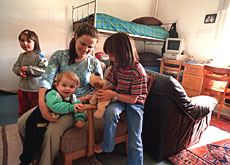Tough ride for foreigners in Swiss job market

Second-generation foreigners in Switzerland still face discrimination on the labour market even if they have lived in the country from an early age.
That is the conclusion of a series of studies into the integration of non-Swiss in the workplace, backed by the Federal Office of Immigration, Integration and Emigration.
The results demonstrate that often the country of origin of a job candidate plays an important role for employers in deciding whether to consider particular applications. Other criteria, such as suitability for the position or appropriate qualifications, fall by the wayside.
The studies found that people of former Yugoslav origin fared the worse.
The surveys concentrated on the so-called “secondos”, second-generation immigrants to Switzerland, who were either born here or arrived in the country at an early age. They often do not hold Swiss citizenship but possess long-term residency permits.
Rosita Fibbi from independent research institute Swiss Forum for Migration (SFM) – and author of one of the studies – says the focus has too often been on the integration of foreigners. She says the difficulties that non-Swiss workers can face every day have not been adequately addressed.
“What we came up with was that discrimination is a reality on the labour market – this is something that had never been imagined before. The new issue is how society treats immigrants that play the game of being willing to integrate in the country.”
Measuring discrimination
For its study, SFM used a method devised by the International Labour Organization known as “practice testing” for the first time in Switzerland.
These results measure the level of discrimination shown by a company towards a “type” of person applying for a post.
SFM found that an Albanian speaker from former Yugoslavia faced a discrimination rate of 59 per cent in German-speaking Switzerland.
In other words, if such a candidate sent 100 applications, he would most likely receive 59 straight rejections.
The discrimination rate for a Portuguese candidate with the same qualifications was just under ten per cent.
Peter or Mehmet?
SFM created three fictional candidates, who “sent” applications to a number of Swiss firms.
The “men” were given names like Peter, Afrim and Mehmet to denote ethnic origins from Portugal, Turkey and the former Yugoslavia.
They were the same age, possessed identical qualifications – having completed their education in Swiss schools – had the same experience and were long-term Swiss residents.
The vacancies were for jobs as bakers, watchmakers, mechanics, salesmen and receptionists.
SFM then analysed the responses from prospective employers in the French, German and Italian-speaking parts of Switzerland.
In one typical instance, Peter and Afrim applied for the same job as sales assistant.
Three days later, Afrim received a letter from the company telling him that the post had already been filled.
On the same day Peter got a phone call from the same firm, inviting him for interview.
The study also found that foreigners were likely to come across a higher degree of discrimination on the job market if they applied in German-speaking Switzerland.
Early seeds
The seeds of discrimination are sown early in Switzerland, the studies found. According to Thomas Meyer of the project Transitions from Education to Employment (Tree), the process begins at school.
Tree carried out a study for the Federal Office of Immigration, Integration and Emigration into the crossover from school to working life for young people.
“Equality of chance is not present in the Swiss educational system from day one. Even if a migrant youth has the same competence [as a Swiss person] at the end of compulsory school, we can see from our study that the chances of getting an apprenticeship – which is the most important part of post-compulsory education in Switzerland – are hampered or restricted,” Meyer said.
The battle is made harder by the lack of legislation in Switzerland preventing discrimination against foreign workers, says Fibbi.
“There is no special legal framework that forbids discrimination apart from Article 8 of the [Swiss] constitution, which prohibits it on the basis of origin,” she said.
Fibbi says that discrimination in the workplace has to be tackled first at the grassroots level.
“Our first challenge will be to make people aware that this kind of situation is not normal and only when people share this analysis, can we [think about] what we can do and perhaps set up a legal framework that prohibits discrimination. I think we have a long way ahead of us.”
swissinfo, Faryal Mirza
Second-generation foreigners suffer discrimination on the job market even if they have lived in Switzerland for many years and have gone to Swiss schools.
Studies found that the country of origin of a candidate was a deciding factor for employers when considering whether to offer an interview.
This worked to the detriment of people from former Yugoslavia, who faced the most discrimination.

In compliance with the JTI standards
More: SWI swissinfo.ch certified by the Journalism Trust Initiative



You can find an overview of ongoing debates with our journalists here. Please join us!
If you want to start a conversation about a topic raised in this article or want to report factual errors, email us at english@swissinfo.ch.